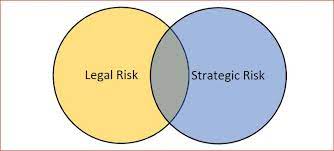In-House Counsel and Risk Management

A good lawyer knows the law; a clever one takes the judge to lunch. — Mark Twain
Lawyers get a bad rap – not just as the subject of lawyer jokes. (This is not an invitation to recite lawyer jokes). I recently wrote about the unique skills that compliance professionals possess in risk management. CCOs are “comfortable” assessing risk, prioritizing risks and then mitigating risks based on a mitigation strategy.
Let me add to the list. Among many of the talents that in-house counsel possess is the ability to identify, assess, and mitigate risks.
Lawyers, however, have a little different perspective. Lawyers operate with a “worst-case” scenario mindset that addresses a potential event that creates legal risks (e.g. breach of a contract, intervening event like an “Act of God”). In response, the lawyers will protect against that risk – they may ultimately advise a company to reject a specific business arrangement or contract, or they may recommend entering into a relationship with a third party with appropriate legal protections.
In this scenario, in-house counsel needs to learn about the specific transaction or course of action, identify the risks, consult with the in-house business representatives, and then ultimately guide the company with a balancing of benefits against risks. In doing so, in-house counsel’s assessment of risks incorporates reputational and business risks, along with standard legal risks and legal exposure to potential litigation claims.

On top of this analysis, in-house counsel are sensitive to company stakeholders, as well as government investigation and enforcement risks. In-house counsel, along with the CCO, bring together a powerful synergy where corporate risks can be considered in a holistic manner – legal, ethical, culture, reputation and business risks can be identified, weighed and considered against the positive benefits.
In-house counsel always identify and weigh potential litigation claims and possible government investigation and enforcement actions. Companies are risk averse, and rightfully so, when faced with government investigation and prosecution risks. However, in-house counsel often weigh legal risks, possible claims against the company client, and the realistic likelihood of litigation.
Talented in-house counsel are able to translate these skills to advise business leaders, and in many cases the CEO, on business strategy, risk management, and C-Suite leadership strategies. In-house counsel who repeatedly point out worst case scenarios are often ignored or have a minimized role; while successful general counsels bring a fresh and broad perspective to senior executives that incorporate sophisticated balancing of business opportunities, legal consequences and overall strategy.

General counsel and CCOs are natural partners in the corporate governance world. Effective partnerships between these two functions should be carefully cultivated because of the positive benefits from a coordinated and compatible alliance between legal and compliance. Too much time is spent focused on internal turf wars – a legal and CCO partnership lifts the legal function and the CCOs standing in the organization. Both functions win from an effective partnership.
The downside of a dysfunctional legal and compliance partnership is substantial. These unworkable situations are difficult to watch and navigate. It is such a tragic loss of a potential opportunity. In-house counsel and compliance professionals exist for specific benefits – the power of them together, however, is much more than the sum of their parts. If working together, in-house counsel and compliance can bring about a strong ethical culture, mitigated risks and minimal government enforcement risks.
















Mr. Volkov,
For several years I worked with communities and counties to enhance their risk management capabilities… when an exposure resulted in damages, my responsibility was to put the related issue to rest. I worked with city attorneys, county attorneys, and county commissioners on a weekly basis, and when necessary, the community would bring in a local attorney to address civil legal issues. In other words, I was basically an insurance adjuster working outside the insurance industry.
Risk Management takes on many forms, and often the key force at work is the ethical conduct engaging the actors involved. I was, in a sense, a CCO, working with a host of legal power players, all of which were trying to accomplish a common goal. Most, if not all, of the lawyers I worked with shared ethics as a common character trait. They would often take my advice, or offer an opinion that would help bring the issue to a close quickly. Most had high retention dollars (aka deductibles) to spend before the insurance company would become involved, typically a million dollars. Tensions would elevate quickly when the “injury” was elevated. The key element was respect for one another. Without ethics and respect, the game is over.
Your comments in this post accurately portrays corporate compliance requirements as accurately as any other post I have read from your website since I started reading them years ago….. thank you.